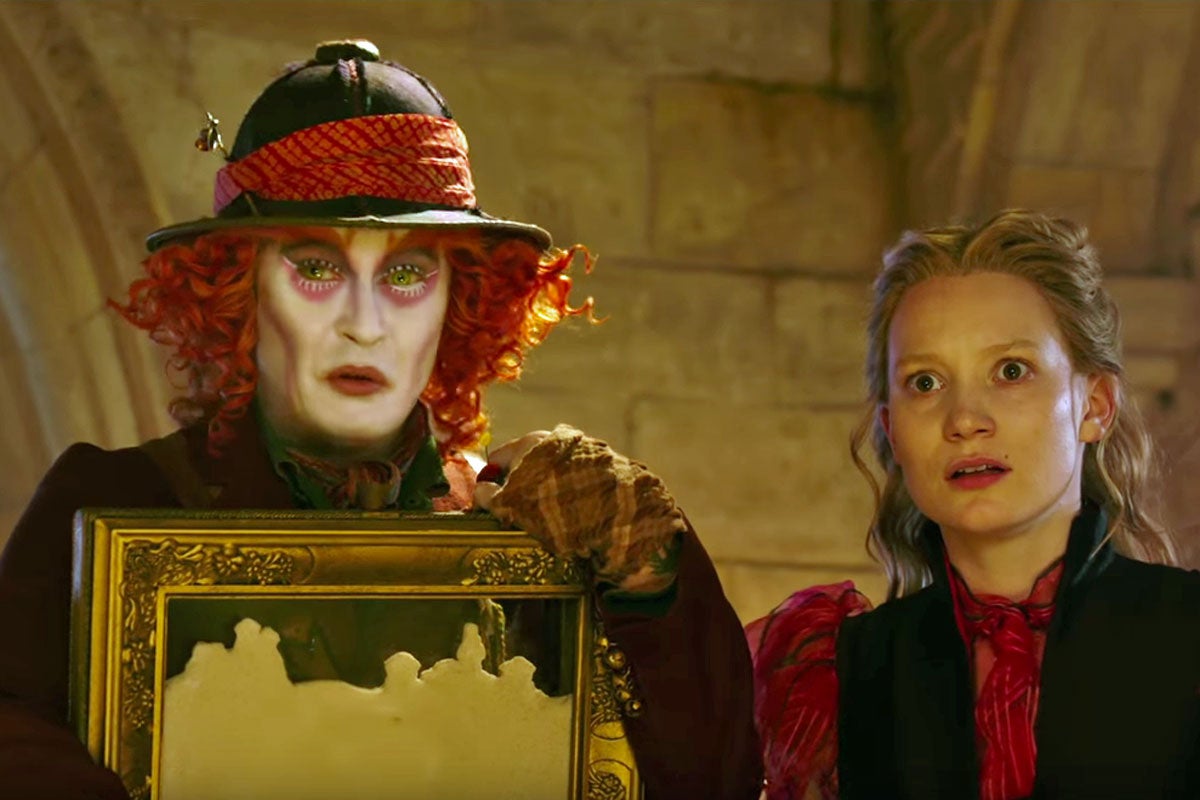Alice Through the Looking Glass review: A myriad of distractions
It is bursting with colour, slapstick and ideas but what becomes curiouser and curiouser is its lack of finesse.

Your support helps us to tell the story
From reproductive rights to climate change to Big Tech, The Independent is on the ground when the story is developing. Whether it's investigating the financials of Elon Musk's pro-Trump PAC or producing our latest documentary, 'The A Word', which shines a light on the American women fighting for reproductive rights, we know how important it is to parse out the facts from the messaging.
At such a critical moment in US history, we need reporters on the ground. Your donation allows us to keep sending journalists to speak to both sides of the story.
The Independent is trusted by Americans across the entire political spectrum. And unlike many other quality news outlets, we choose not to lock Americans out of our reporting and analysis with paywalls. We believe quality journalism should be available to everyone, paid for by those who can afford it.
Your support makes all the difference.James Bobin, 113 mins, starring: Mia Wasikowska, Johnny Depp, Anne Hathaway, Helena Bonham Carter, Alan Rickman (voice), Sacha Baron Cohen, Michael Sheen (voice), Andrew Scott
There’s as much of Christopher Nolan’s Interstellar as there is of Lewis Carroll in this sequel to Tim Burton’s 2010 Alice In Wonderland. This is a film about unpicking time and travelling into the past to redress old wrongs before they wreck the future. It is bursting with colour, slapstick and ideas but what becomes curiouser and curiouser is its lack of finesse.
With so many visual stunts and such exhaustively detailed mise en scène, the main characters risk receding into the distance. There is always so much else going on around them that we don’t pay too much attention to the plight of Alice (Wasikowska) or of the poor deranged Hatter (Depp) pining for his lost family.
Burton remains as a producer but has handed over directing duties to James Bobin (hitherto best known for his work on the Ali G Show and Flight Of The Conchords for TV and for two Muppet movies).
The story begins (bizarrely) Master And Commander-style with a very spectacular storm at sea. Alice, the ingénue who disappeared down a rabbit hole in the first film, has somehow turned into a hardbitten ship’s captain. Back home in 1870s London, her mother (Lindsay Duncan) is in a parlous financial state, about to lose the family home. Alice’s jilted suitor Hamish (Leo Bill), now married to another woman, is keen to grind Alice down and to force her to take a menial office job. It’s at this point she disappears through the looking glass.
In Wonderland, everyone is as glum as they are in London. Hatter is very depressed and feels betrayed when Alice suggests it will be impossible to bring his family back to life. The White Queen (Anne Hathaway) advises Alice that the only way of saving Hatter is travelling into the past. Alice, therefore, visits Time, a Wizard of Oz-like magus played by Sacha Baron Cohen (clearly modelling his portentous German accent on that of filmmaker Werner Herzog.) Alice steals his Chronosphere and heads back across the oceans of time.
The film is full of visual and verbal gags about the nature of time. Seconds are portrayed as little mechanical creatures that turn into minutes. The Chronosphere itself is the kind of device you might expect to find in an HG Wells story about time travel.
In its quieter moments, Through The Looking Glass is dealing with yearning, guilt, and regret. We discover just why the Red Queen (Helena Bonham Carter again in splendidly imperious, Bette Davis-like form) is so keen to cut off people’s heads and learn dark secrets about the White Queen’s biscuit-eating childhood. Screenwriter Linda Woolverton shows considerable ingenuity in the way she creates backstories for Lewis Carroll’s characters.
The performances are appealing; Depp plays the Hatter as an absent-minded, gap-toothed, slightly forlorn and foppish English aristocrat who has forgotten how to laugh. Wasikowska’s Alice is resilient and single-minded: a no-nonsense Victorian action-heroine who defies the doctor’s description of her as a "textbook case of female hysteria." There’s an obvious poignancy in hearing the late Alan Rickman’s instantly recognisable voice as Absolem, the sardonic caterpillar who beckons Alice back down to Underland.

Watch Apple TV+ free for 7 days
New subscribers only. £8.99/mo. after free trial. Plan auto-renews until cancelled

Watch Apple TV+ free for 7 days
New subscribers only. £8.99/mo. after free trial. Plan auto-renews until cancelled
Visually, the film impresses too. The use of 3D is far more inventive than in most movies blending live action and animation. There are constant switches in size and perspective and its scenes of characters running down corridors or falling from great heights. The colour is luxuriant; the costume and production design are lavish in the extreme.
For all its strengths, the film feels very overcooked. There is just too much thrown into the mix. In any given scene, there will always be a myriad of distractions. Instead of focusing on the plot, you’ll notice the extravagant whiskers of the Victorian gentlemen or the miniature portraits hanging in the background or the different shades in Alice’s multi-coloured kimono. There are so many trick shots and special effects, so much fairground spectacle, so much kitsch and bombast that the human factor here risks being squashed out of existence.
Join our commenting forum
Join thought-provoking conversations, follow other Independent readers and see their replies
Comments